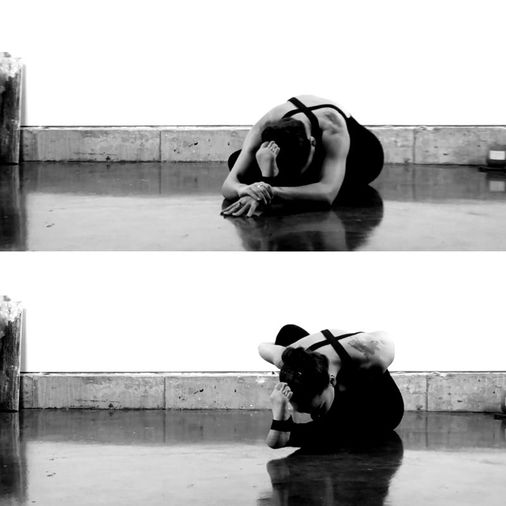|
This post covers days 12, 13 & 14 of the Purple Valley Yoga challenge. If you'd like, you can read all previous sutra posts in the Exploring the Sutras category. *all translations of the Yoga Sutras are by Sri Swami Satchidananda* Sutra 1.40: Paramānu paramamahattvānto'sya vaśikārah ~ "Gradually, one's mastery in concentration extends from the primal atom to the greatest magnitude." Sutra 1.41: Ksīna vrtter abhijātasyeva maner grahitr grahana grāhyesu tatsha tadañjanatā samāpattih ~ "Just as the naturally pure crystal assumes shapes and colours of objects placed near it, so the yogi's mind, with its totally weakened modifications, becomes clear and balanced and attains the state devoid of differentiation between knower, knowable and knowledge. This culmination of meditation is samādhi."  If we return to the previous sutras for context, Patanjali has instructed the spiritual aspirant in various different paths to samādhi. All methods and practices share the common aim of stilling the mind in the pursuit of self-awareness and absorption with the divine. These sutras could be the root philosophy from which "The Secret" was born -- Patanjali is suggesting here that the devoted practitioner will eventually reach this state of unity and bliss with unwavering dedication and single-pointed focus, and when they do, everything will be knowable to them, or within their reach. Without getting too scientific, in his commentary, Sri Swami Satchidananda discusses neuroplasticity and the yogic belief that the mind can give power to those thoughts it focuses on, essentially building pathways either toward imprisonment or liberation. I've always struggled a bit with understanding samadhi, which I don't think is unusual, but here's why: there have been two particular instances in my own life that I have understood as samadhi, and they've felt like an incredible gift from the divine to remind me of my nature and purpose here, but they have (obviously) been temporary and fleeting; sutra 1.46 helps explain why this might be. Sutra 1.42: tatra shabda artha jnana vikalpah sankirna savitarka samapattih ~ "The samadhi in which name, form and knowledge of them is mixed is called savitarka samadhi, or samadhi with deliberation. Sutra 1.43: smriti pari-shuddhau svarupa-shunya iva artha-matra nirbhasa nirvitarka ~ "When the memory is well purified, the knowledge of the object of concentration shines alone, devoid of the distinction of name and quality. This is nirvitarka samadhi, or samadhi without deliberation." Sutra 1.44: etaya eva savichara nirvichara cha sukshma-vishaya vyakhyata ~ "In the same way, both savicara (reflective) and nirvicara (super or non-reflective) samadhi, which are practiced upon subtle objects, are explained." Sutra 1.45: sukshma vishayatvam cha alinga paryavasanam ~ "The subtlety of possible objects of concentration ends only at the undefinable." Sutra 1.46: tah eva sabijah samadhih ~ "Each of the above kinds of samadhi are sabija (with seed), which could bring one back into bondage or mental disturbance." In sutras 1.42 - 1.46, Patanjali returns to the different types of samadhi and paths of reaching them. With savitarka ("with deliberation") samadhi, the understanding of the object of meditation is concrete and thorough, with the ability to separate the whole into its most minute parts. He continues with nirvitarka samadhi, which is "without deliberation", when only the pure knowledge of the object remains and everything else fades away. Sri Swami Satchidananda claims this practice gives you the knowledge of the Knower also. Sutra 1.47: Nirvicāra vaiśāradye 'dhyātma prasādah ~ "In the purity of nirvicārā samādhi, the supreme Self shines." Sutra 1.48: Rtambharā tatra prajñā ~ "This is rtambharā prajñā, or the absolute true consciousness." He continues on in his commentary of the following sutras with an emphasis on purity of mind, as obtaining this sort of control of the mind and freedom from the mental modifications is extremely powerful. "Rtamharā" can be translated as "wisdom-filled-with-truth", or a complete understanding without the need for study. Sutra 1.49: Srutānumāna prajńābhyām anya visayā viśesārthatvat ~ "This special truth is totally different from knowledge gained by hearing, study of scripture, or inference. Sutra 1.50: Tajjah samskāro'nya samskāra pratibandhi ~ "The impression produced by this samādhi wipes out all other impressions." Sutra 1.51: Tasyāpi nirodhe sarva nirodhān nirbijah samādhih ~ "When even this impression is wiped out, every impression is totally wiped out and there is nirbīja [seedless] samādhi" With these last three sutras in Samādhi Pāda, the book on contemplation, Patanjali comes to the most complete form of samādhi, which fittingly translates as "seedless". Here, Sri Swami Satchidananda says, you realize your immortality and break free from the bonds of birth and death.
I think an interesting distinction here is that even the division of the wisdom (prajñā) and the owner of that wisdom keeps us from becoming completely absorbed in this divine bliss. Sri Swami Satchidananda talks about jivanmukta in sutra 1.50, which he describes as a "realized saint", and I've absolutely met a few people in my life who I'd describe this way. There are teachers everywhere for us on this path - the key is recognizing them.
0 Comments
Your comment will be posted after it is approved.
Leave a Reply. |

